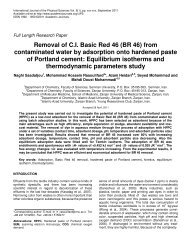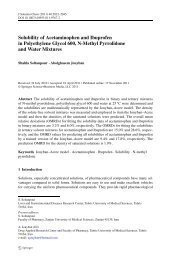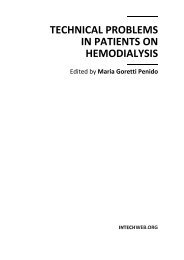UPDATED TOPICS IN MINIMALLY INVASIVE ABDOMINAL SURGERY
UPDATED TOPICS IN MINIMALLY INVASIVE ABDOMINAL SURGERY
UPDATED TOPICS IN MINIMALLY INVASIVE ABDOMINAL SURGERY
You also want an ePaper? Increase the reach of your titles
YUMPU automatically turns print PDFs into web optimized ePapers that Google loves.
66<br />
Updated Topics in Minimally Invasive Abdominal Surgery<br />
lesions, occurring in over 20% of patients. These complications are more likely to occur in<br />
men and with lesions greater than 5cm in diameter (Dokmak, S et al 2009). Perhaps the<br />
most feared complication of hepatocellular adenoma is malignant degeneration. The risk has<br />
been reported in the range of 8-10%(Dokmak, S et al 2009; Paradis, V 2010). Although 5cm<br />
is the generally accepted size at which malignant degeneration becomes a concern, cases<br />
have been reported in lesions as small as 4cm (Micchelli, ST et al 2008). There is also a<br />
greater risk of malignant degeneration in males and in patients with the metabolic<br />
syndrome. Malignancy within adenomas is typically discovered only after surgical<br />
resection.<br />
2.3.3 Management<br />
In the case of small adenomas in the setting of oral contraceptive use, a period of<br />
observation following the cessation of contraception is warranted. Surgical resection in this<br />
setting is then reserved for lesions which fail to regress or continue to grow after stopping<br />
the offending medication. As with other benign lesions, symptomatology that can clearly be<br />
attributed to the adenoma is also an indication for surgical resection. The presence of<br />
multiple adenomas, or adenomatosis, is an arbitrary distinction rather than a distinct<br />
pathologic subtype, thus indications for resection are the same as for solitary adenoma.<br />
Because of the well defined risk of malignant degeneration, there are also cases where<br />
resection of asymptomatic lesions is warranted. Generally accepted criteria include<br />
adenomas greater than 5cm in size, or any adenoma in a male, regardless of size (Dokmak, S<br />
et al 2009).<br />
2.4 Other benign lesions<br />
2.4.1 Angiomyolipoma<br />
Angiomyolipoma is a rare benign tumor of mesenchymal origin. They most commonly<br />
occur in women and are discovered as incidental findings. Histologically, angiomyolipoma<br />
is composed of fat cells, blood vessels, and smooth muscle. CT imaging will show early<br />
enhancement that remains throughout the more delayed phases. Positive staining with<br />
HMB-45, with negative staining for cytokeratins 18 and 19, help to secure the diagnosis<br />
(Ding, GH et al 2011; Sturtz, CL & Dabbs, DJ 1994). Malignant degeneration is very rare, as<br />
is rupture, with three cases reported in the world literature. Because of the rare nature of<br />
serious complications, an initially conservative management strategy of imaging follow up<br />
is recommended when the diagnosis is established. Recently proposed guidelines for<br />
surgical resection of angiomyolipoma are as follows: symptomatic disease, tumors greater<br />
than 6cm, tumors which grow on repeated imaging, tumors showing extrahepatic growth<br />
with risk of rupture, and inability to make a definitive diagnosis on imaging or biopsy<br />
(Ding, GH et al 2011).<br />
2.4.2 Nodular regenerative hyperplasia<br />
Nodular regenerative hyperplasia (NRH) is characterized by diffuse involvement of the<br />
liver by multiple regenerative nodules in the absence of significant fibrosis. The incidence of<br />
NRH in a large autopsy series has been reported at 2.6% (Wanless, IR 1990). The disease<br />
typically manifests in the setting of systemic disorders such as Felty’s syndrome or with the<br />
use of chemotherapeutic agents, of which azathioprine is the most common (Reshamwala,<br />
PA et al 2006). Complications are rare, as demonstrated by Wanless’ series in which only 1














![focuspdca.ppt [Compatibility Mode]](https://img.yumpu.com/22859457/1/190x146/focuspdcappt-compatibility-mode.jpg?quality=85)


